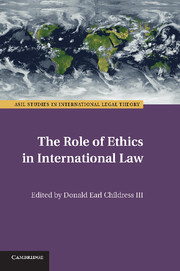Book contents
- Frontmatter
- Contents
- Contributors
- Acknowledgments
- Introduction
- Part one The Role of Ethics in Public International Law
- Part two The Role of Ethics in Private International Law
- Part three Normative and Theoretical Perspectives
- 9 Human Rights: Ethical, Political…or Legal? First Steps in a Legal Theory of Human Rights
- 10 The Ethic of International Law
- Index
- References
9 - Human Rights: Ethical, Political…or Legal? First Steps in a Legal Theory of Human Rights
Published online by Cambridge University Press: 05 December 2011
- Frontmatter
- Contents
- Contributors
- Acknowledgments
- Introduction
- Part one The Role of Ethics in Public International Law
- Part two The Role of Ethics in Private International Law
- Part three Normative and Theoretical Perspectives
- 9 Human Rights: Ethical, Political…or Legal? First Steps in a Legal Theory of Human Rights
- 10 The Ethic of International Law
- Index
- References
Summary
Introduction
(International) human rights theory is en vogue. It has been the case for quite some years in Germany,2 (see footnote on next page) and it is now also the case in Anglo-American circles. One of the very first issues a human rights theorist is expected to address is the nature of human rights and, hence, of human rights theory.
The nature of human rights theory is an important concern for at least two reasons. First of all, thinking about the nature of human rights theory situates it within a broader set of theories, in particular legal theory, democratic theory, or theories of justice, and can generate beneficial connections between them. Too often, human rights theorists fail to reveal those links, and the credibility of their theories is partly undermined by the artificial severance of those connections given the centrality of human rights to human individual and social life. Second, thinking about the nature of theory requires a preliminary clarification of what it is a theory of and, therefore, of the nature of human rights. Such a preliminary consideration can prove very beneficial in fully identifying or at least delineating the object of one's theoretical endeavor. The answers to many of the important questions that human rights theorists identify as being central to human rights theory, particularly the existence, function, content, weight, scope, and justification of human rights, are conditioned by the theorists’ original characterization of the nature of their theory and its object. Finally, some human rights theorists may even want to argue that human rights theorizing is part of human rights practice and of their object of study as a consequence. This implies in turn that the nature of human rights theory should not escape their meta-theoretical attention.
- Type
- Chapter
- Information
- The Role of Ethics in International Law , pp. 211 - 245Publisher: Cambridge University PressPrint publication year: 2011
References
- 5
- Cited by



